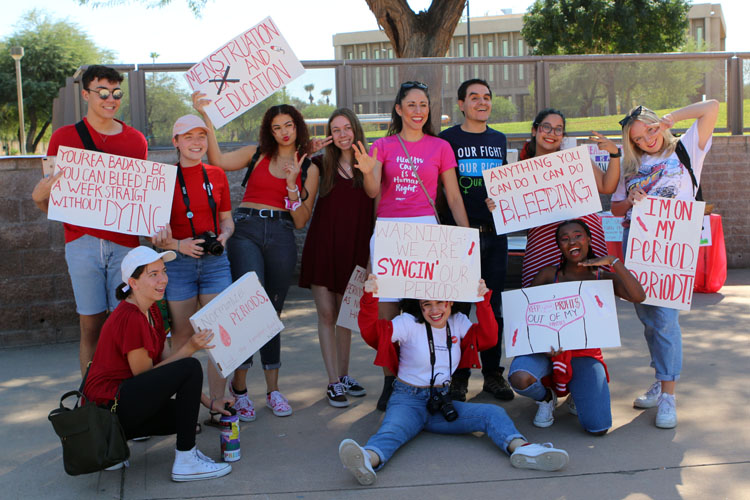Amid calls to end “period poverty,” dozens of activists from across Arizona convened for the first National Period Day protest to call for an end to sales taxes for menstrual products — the so-called “tampon tax” and more widespread availability of items to help those who can’t afford them.
The “menstrual equity” movement has been gaining steam globally, with increased attention in the media and documentaries like the Oscar-winning “Period. End of Sentence.” The film explores the stigma of menstruation in India, where a machine helped women make low-cost sanitary pads.
Forty or so activists from across the state gathered Saturday at Wesley Bolin Memorial Plaza to demand more action to address menstrual inequities in Arizona, where legislation to eliminate sales taxes on menstrual products failed to pass this year. Previous attempts to eliminate the tax also have failed.
“We need to talk about the fact that tampons and period products are taxed, while other products, like Viagra, (are not). And we have to examine why these policies exist and what we can do to make access to period products more equitable,” said Induja Kumar, founder of the Arizona chapter of the organization PERIOD.
Nationally, groups like PERIOD, Period Equity and others have been working not just to change tax policy but to provide free menstrual products to those who need them.
In a study of 1,000 U.S. teens ages 13 to 19, commissioned by PERIOD, 1 in 5 said they had either struggled to afford menstrual products or had not been able to purchase them at all. Additionally, 1 in 4 teens said they’d missed class due to a lack of hygiene products.
Seventeen percent of Arizonans live below the poverty line, with women ages 25 to 34 the largest demographic in that group.
Demetra Presley, a sponsor of the Phoenix rally, founded Go With the Flow in 2017 to provide schools in Tucson and Phoenix with “period packs” containing menstrual hygiene products
for students.
There are reasonable solutions to limit period poverty, she said, but the first step is to break the stigma of discussing menstruation.
“There’s still a lot of taboo,” Presley said. “As a result, we aren’t able to effectively address these issues.”
The Period Day rallies, held across the U.S., were inspired by a growing conversation around menstrual equity led in part by Nadya Okamoto and her group PERIOD – a youth-run global organization that fights to end period poverty and stigma through service and education.
Okamoto, 21, founded the organization when she was still in high school, and PERIOD now has chapters in all 50 states and 30 countries. A student at Harvard, Okamoto continues to lead the movement with a goal of helping the world’s most vulnerable.
“I was inspired by a point in my own life where my family was experiencing living without a home of our own, and I was having conversations with homeless women who were in much worse living situations than I was in,” Okamoto said in a phone interview. “I was hearing stories of these women using toilet paper, socks, brown paper grocery bags and cardboard to take care of their periods because they were living in such impoverished communities.”
In past years, dozens of states have considered bills to eliminate taxes on menstrual products. Six have passed – in Connecticut, Florida, Illinois, Nevada, New York and Rhode Island, according to the group Period Equity.
The Tax Foundation, a Washington, D.C., tax policy group, opposes the elimination of taxes for menstrual products, saying sales taxes should apply to all consumer purchases, whether necessities or luxuries. Exemptions violate sound tax policy, the group argues, and could result in less revenue for states and lead to tax increases.
Story by Kyley Warren, Cronkite News




